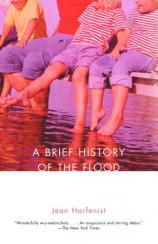Reading Group Guide
Discussion Questions
A Brief History of the Flood

1. As the book opens, Lillian's mother, Marion, looks around the breakfast table at her husband and children and says, "Now this is how it's supposed to be" [p. 3]. What does she mean? What does the author want the reader to understand from this comment?
2. Marion creates a surprising pontoon-boat float for her family to ride on in the Acorn Lake Fourth of July boat parade. Its theme might be viewed as a baseline for eight-year-old Lillian's ideas about what life is supposed to be like. What events force her to reconsider? If Lillian, as an adult, were to construct a pontoon-boat float symbolizing her own idea of happiness, what theme might she choose?
3. Some families seem to be held together by the glue of secrets. What secrets do the Andersons keep? Why? Would those same secrets be kept in a family today?
4. What is the significance of the girls who work the nightshift making salads for airline flights? How do they add to our understanding of Lillian's life? Of Marion's? Are they merely relics of a time gone by, or are they still relevant today?
5. Lillian says about her best friend, Irene, "Once you reach homecoming queen, there's no place else to go but bad" [p. 159]. What does this statement say about small towns? About opportunities for girls?
6. Little violence takes place in the Anderson household, yet Lillian's father, Jack, has a talent for making the entire family feel as if they're living under a clenched fist. How is this tension created and maintained? What makes this tension tolerable to Lillian? To the reader?
7. Is Lillian a reliable narrator? Does she ever lie to the reader, or to herself?
8. The title comes from a letter Marion writes to the IRS. Why do you think the author chose this title? What might you have called it?
9. Lillian says, "I don't want anybody ever looking at me like the girl who got her ducks shot" [p. 57]. What does this statement reveal about her character? Do any of the other family members share this sentiment?
10. Lillian says of her best friend, Irene, "Nothing you can say will shock her" [p. 107], and she notes that Irene "can sweep a room clean of guilt, doesn't matter who owns it or how they earned it. Usually that's what you want in a friend" [p. 105]. What does Irene offer Lillian that she can't get from other relationships? In what ways does Irene resemble Lillian's mother? How are they different?
11. Why doesn't Marion seem to see Jack's failings as a husband and father?
12. How are Lillian's actions in "Duck Season" a continuation of what took place in "Body Count?"
13. What role does shame play in the Andersons' behavior? What are its sources? Which children are most affected by it? Why? How does it influence their choices?
14. Men generally aren't portrayed here in a positive light. What type of men do you think Randy and Davey will become? Why?
15. At the end of the book how does each member of the Anderson family think "it's supposed to be" [p. 3]?
A Brief History of the Flood
- Publication Date: July 8, 2003
- Paperback: 224 pages
- Publisher: Vintage
- ISBN-10: 0375713352
- ISBN-13: 9780375713354







